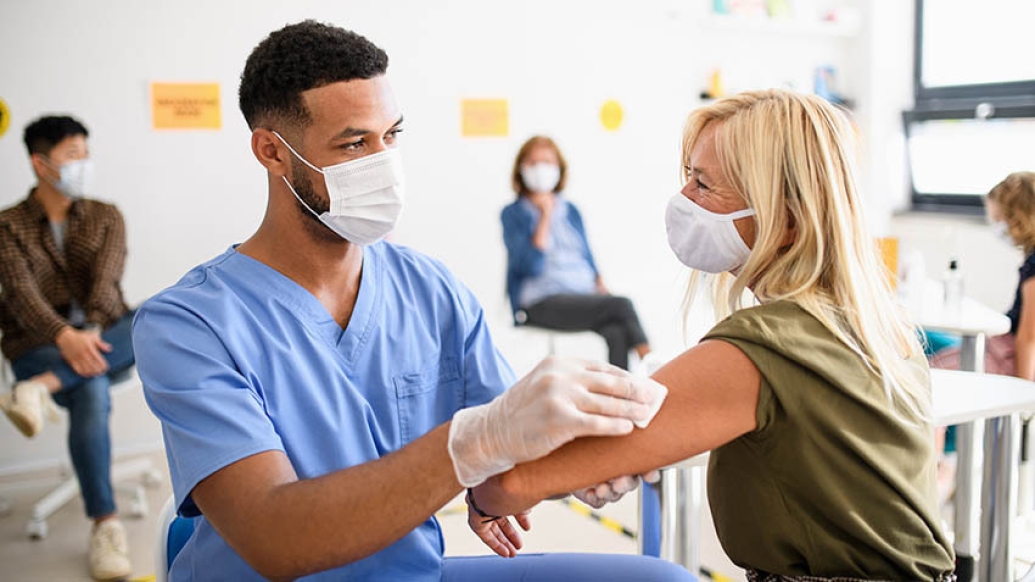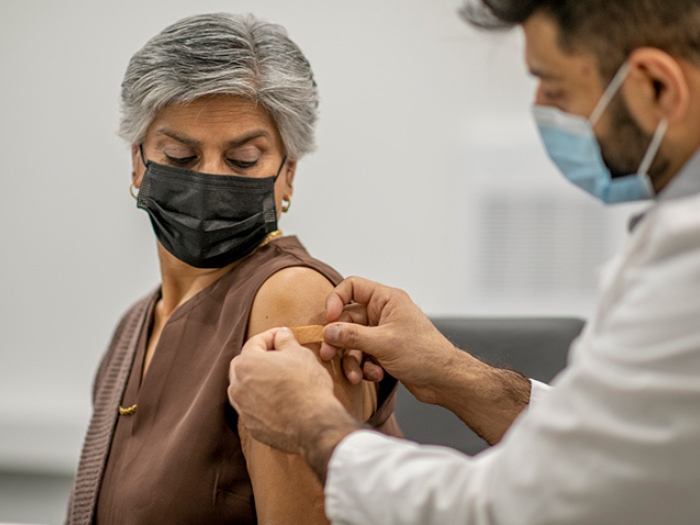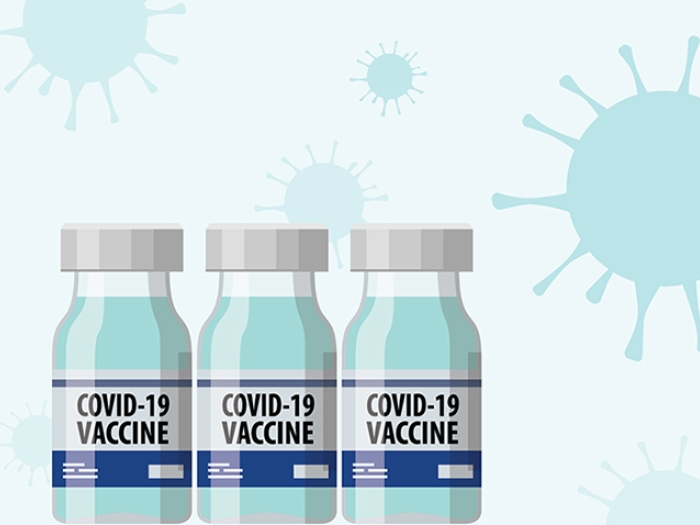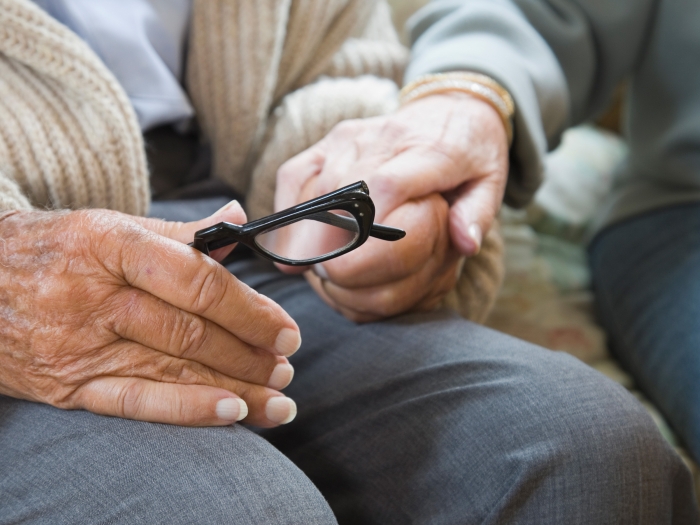People of color and those with lower incomes or education less likely to say they’ll seek vaccination.
2:31 PM
Author |

Once enough people receive effective vaccines against the novel coronavirus, experts say, the end of the pandemic may be in sight. But a new poll suggests an uphill climb for one of the highest priority groups for vaccination – older adults.
In all, 58% of adults aged 50 to 80 say they are somewhat or very likely to get vaccinated to prevent COVID-19, according to new results from the National Poll on Healthy Aging from the University of Michigan.
That number went up to 66% when the poll team asked the question a different way: 20% said they'd want to get vaccinated right away when vaccines become available, but 46% said they'd rather wait for others to get vaccinated first before doing it themselves.
Women, people of color, people between 50 and 64 years old, and those with lower incomes and education levels were less likely to say they'd seek vaccination in general. Only 40% of older adults who are Black, and 51% of those who are Hispanic, said they are somewhat or very likely to get vaccinated, despite the greater risk of hospitalization and death for members of these groups if they develop COVID-19.
People over age 65, whites, men and those with higher levels of education were more likely than others to say they'd want to get vaccinated right away. One-quarter of respondents said they'd consider taking part in a vaccine clinical trial.
SEE ALSO: Questions and Answers About COVID-19 Vaccine Clinical Trials
The new results come from a poll taken in October for U-M's Institute for Healthcare Policy and Innovation, with support from AARP and Michigan Medicine, U-M's academic medical center. The poll draws from the answers of a national sample of more than 2,000 adults aged 50 to 80.
"Effective vaccines will be crucial to getting this pandemic under control and preventing serious illness and death from COVID-19, especially among people over 50 and those with underlying health issues," says Preeti Malani, M.D., the poll's director and a specialist in geriatrics and infectious diseases at Michigan Medicine. "Our findings point to a strong need to communicate effectively and transparently about how well the vaccines work, the safeguards built in to protect the safety of recipients and the public health importance of widespread vaccination starting with priority groups."
Key messengers and messages for a COVID-19 vaccine
Getting out the word about the efficacy of each vaccine will be paramount, the poll suggests; 80% of respondents said that they'll consider how well a vaccine works as part of making their vaccination decision.
Health care providers will also play a critical role in talking with older adults about the vaccine, the poll suggests. Just over half of the older adults polled said their doctor's recommendation would be very important to their decision about vaccination. Just over 40% called recommendations from public health officials very important.
MORE FROM THE LAB: Subscribe to our weekly newsletter
More than half of the respondents said their own research into information available about COVID-19 vaccines will factor into their decisions. That makes it important for the news media, government, vaccine makers, health organizations, hospitals and nonprofits to share easily understandable and accurate information about vaccines, Malani says.
This includes sharing information about any issues spotted in clinical trials, and about the safeguards in place during vaccine development. Nearly half of poll respondents said they worry about the safety of a rapidly developed vaccine.
One factor that didn't seem to make a difference in a person's inclination to be vaccinated against COVID-19 was their personal experience with the disease, either in themselves or someone they know.
Just over half of poll respondents knew someone who had had COVID-19, and 2% said they'd been infected themselves. Nearly one in five said they knew someone who had died of COVID-19. But members of these groups were no more likely to say they'd get vaccinated.
Messaging about the cost of vaccine for consumers also appears to be important. Nearly one-third of respondents said cost was very important to their decision about vaccination.
"Any coronavirus vaccine must be FDA-authorized or approved, safe, effective and accessible. Once vaccines are available, it will be important for Americans to talk to their providers to understand which vaccine is best for them and make an informed choice, and for public health officials to monitor uptake and the impact on community health," says Alison Bryant, Ph.D., senior vice president of research for AARP. "AARP is urging the government to be transparent about the development and authorization or approval process for any vaccines. It is also important to engage higher risk groups, hear their concerns and work to address them honestly and with sensitivity."
Reaching those who are on the fence about vaccination– including the 14% who are unsure, and the 11% who are somewhat unlikely to get vaccinated— will also be important.
More findings in older adults polled about a COVID-19 vaccine
Most poll respondents appear to agree with recommendations from public health authorities that getting a flu shot and prioritizing COVID-19 vaccine for the highest risk members of society are both good ideas.
Nearly three-quarters of respondents said they had already gotten vaccinated against the flu, or intended to. Nearly half said it was more important to get a flu shot this year than previously.
SEE ALSO: The Top 5 COVID-19 Vaccine Candidates Explained
Nearly all respondents (93%) agreed it's important to prioritize giving COVID-19 vaccines to high risk individuals. Older adults, those who work directly with the public in healthcare and other professions, and people with underlying health conditions and weak immune systems, have all been identified as possible priority groups.
The National Poll on Healthy Aging results are based on responses from a nationally representative sample of 1,556 adults aged 50 to 80 who answered a wide range of questions online. Questions were written, and data interpreted and compiled, by the IHPI team. Laptops and Internet access were provided to poll respondents who did not already have them.
Like Podcasts? Add the Michigan Medicine News Break on iTunes or anywhere you listen to podcasts.

Explore a variety of healthcare news & stories by visiting the Health Lab home page for more articles.

Department of Communication at Michigan Medicine
Want top health & research news weekly? Sign up for Health Lab’s newsletters today!





